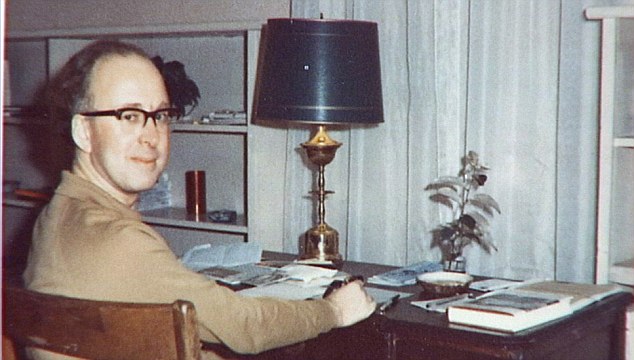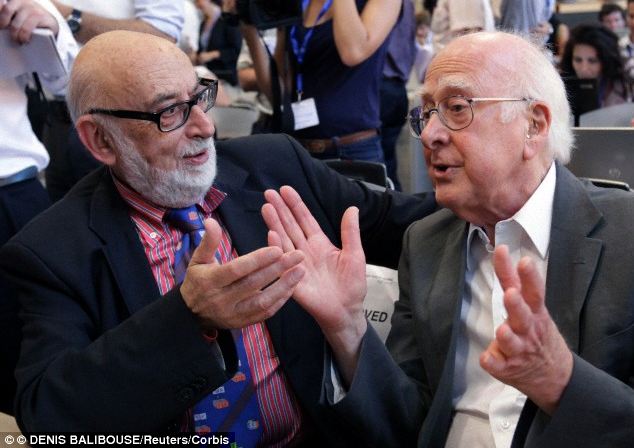Belgian scientist Francois Englert and British scientist Peter Higgs have won the 2013 Nobel Prize in Physics for predicting the existence of the Higgs Boson particle, which is named after the British scientist.
Englert and Higgs theorised about the existence of the particle in the 1960s to provide an answer to a riddle; why does matter have mass?
Their theories were confirmed last year by the discovery of the Higgs particle by Europe's Large Hadron Collider at CERN (the European Organization for Nuclear Research) in Switzerland.
The Nobel prize in physics was awarded to the researchers this morning by the Royal Swedish Academy of Sciences in Stockholm, Sweden.
Francois Englert and Peter Higgs awarded $1.25 million Nobel Prize in Physics for 'God particle' theory
The scientists theorised the existence of the Higgs particle in the 1960s
Their theory was confirmed last year using the Large Hadron Collider
The Higgs, or God, particle has been described as the 'missing link' which explains how parts of the universe interact with one another
By Victoria Woollaston and Ellie Zolfagharifard
8 October 2013
Daily Mail
Daily Mail
Physicists Francois Englert of Belgium and Peter Higgs of Britain have won the 2013 Nobel Prize in Physics for predicting the existence of the Higgs boson particle.
Englert and Higgs theorised about the existence of the particle in the 1960s to provide an answer to a riddle; why does matter have mass?
Their theories were confirmed last year by the discovery of the Higgs particle at a laboratory in Geneva.


The Nobel Prize in Physics was awarded to the researchers this morning by the Royal Swedish Academy of Sciences in Stockholm, Sweden.
In 1964, Englert published a theory that suggested fields interact with fundamental particles and give them mass.
Newcastle-born Professor Peter Higgs, then developed the concept for the boson particle while walking in the Scottish Highlands weeks later.
The Higgs boson's role is to give the particles that make up atoms their mass.
Without this mass, they would zip around the cosmos, unable to bind together to form the atoms that make stars and planets - and people.

The prize was awarded following the discovery of the Higgs Boson, dubbed the 'God particle' last year. The particle was discovered using Europe's Large Hadron Collider, the highest-energy particle collider ever made, in Switzerland

Peter Higgs in the Sixties. The scientist dreamed up the idea of the Higgs boson while walking in the Cairngorms in 1964
The particle was confirmed using the Large Hadron Collider - the highest-energy particle collider ever made, built by the European Organisation for Nuclear Research (CERN) in 2012.
It was designed to let physicists test predictions of different theories concerning particle physics and high-energy physics.
Scientists at the Collider near Geneva smashed together beams of protons – the 'hearts of atoms' – at close to the speed of light, recreating conditions that existed a fraction of a second after the Big Bang.
The discovery was hailed as one of the most important in physics.
‘The awarded theory is a central part of the Standard Model of particle physics that describes how the world is constructed,’ the Royal Swedish Academy of Sciences said in a statement.
‘According to the Standard Model, everything, from flowers and people to stars and planets, consists of just a few building blocks: matter particles.’


Professor Higgs, 83, wiped a tear from his eye as the findings were announced in 2012. He later said: 'It's really an incredible thing that it's happened in my lifetime'
‘At first sight, the Higgs mechanism is a very strange idea indeed,' said Professor Paul Newman, Head of the Particle Physics Group, University of Birmingham.
'It requires the entire universe, even deepest inter-galactic space, to be filled with a new field of a fundamentally different kind from anything previously known.
'The audacity of proposing such a bizarre and all-pervading mechanism based on what was known half a century ago is simply stunning.
'The confirmation of the idea through the LHC's discovery of a Higgs boson is one of the most incredible scientific stories of recent times.

Peter Higgs (right) talks with Belgium physicist Francois Englert (left) before a news conference update in the search for the Higgs boson at CERN. The discovery was hailed as one of the most important in physics
The two scientists had been favourites to share the 8 million Swedish crown ($1.25 million) prize after their theoretical work was vindicated by the CERN experiments.
The will of Swedish dynamite millionaire Alfred Nobel limits the award to a maximum of three people.
WHAT IS THE HIGGS BOSON?
The Higgs boson's role is to give the particles that make up atoms their mass.
It has been described as the ‘missing piece’ of the Standard Model, which explains how the parts of the universe that we understand interact with one another
Without this mass, particles would zip around the cosmos, unable to bind together to form the atoms that make stars and planets - and people.
The particle was confirmed using the Large Hadron Collider - the highest-energy particle collider ever made, built by the European Organisation for Nuclear Research (CERN) in 2012.
However, our knowledge of particle physics is still far from complete, with mysteries such as the nature of dark matter to still be solved.
Britain: A world leader in science
Despite having just 1% of the world's population, British scientists write 12% of the world's science journals
Britain remains the most productive and efficient country in the G8 for scientific research
Britain ranks first amongst the G8 nations on the number of citations in relation to public R&D spending
The UK also continues to rank as second in the world only to the USA on leading scientific indicators, the International Benchmarking Study of UK Research Performance published by Evidence Ltd revealed. These included clinical sciences, health sciences, biological sciences, environmental, and social sciences
Last edited: